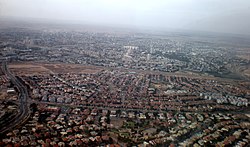Beersheba metropolitan area (Hebrew: מטרופולין באר שבע) is a metropolitan area in Israel that encompasses the Beersheba and Southern Districts of Israel. It is located in the Negev desert and constitutes the fourth largest metropolitan area in the country, with an estimated population of over 377,100.
Beersheba metropolitan area | |
|---|---|
 Beersheba is the eighth largest city in Israel and the centre of the fourth largest metropolitan area in Israel. | |
 | |
| Coordinates: 31°14′59.15″N 34°47′59.07″E / 31.2497639°N 34.7997417°E | |
| Population (2016) | |
• Total | 377,100 |
| • Density | 556.8/km2 (1,442/sq mi) |

Metropolitan rings
editIsrael Central Bureau of Statistics divides the Beersheba metropolitan area into two areas:
| Metropolitan ring | Localities | Population (2016 estimate) | Population density (per km2) |
Annual Population growth rate | |||
|---|---|---|---|---|---|---|---|
| Total | Jews and others1 | Thereof: Jews | Arabs | ||||
| Core2 | 1 | 205,800 | 200,800 | 180,300 | 5,000 | 1,752 | 1.1% |
| Outer Ring3 | 32 | 171,300 | 38,300 | 37,700 | 133,000 | 306 | 3.4% |
| Northern Section | 12 | 90,000 | 12,700 | 12,400 | 77,300 | 292 | 3.4% |
| Eastern Section | 8 | 71,500 | 15,800 | 15,500 | 55,800 | 562.3 | 3.5% |
| Western Section | 12 | 9,800 | 9,800 | 9,700 | 0 | 78.6 | 3.6% |
| Total | 33 | 377,100 | 239,000 | 217,900 | 138,100 | 556.8 | 2.1% |
Notes
Transportation
editTransit
editRail service connects the Beersheba metropolitan area with Ashkelon, Tel Aviv and Haifa. Bus service connects to Eilat, Ashkelon, Tel Aviv, Haifa, and Jerusalem.
Major highways
editSee also
editReferences
edit- ^ "Localities, Population and Density per sq. km. by Metropolitan Area, Rings and Sections, 2016" (PDF). CBS. Archived from the original (PDF) on 2018-01-27. Retrieved 2018-01-09.